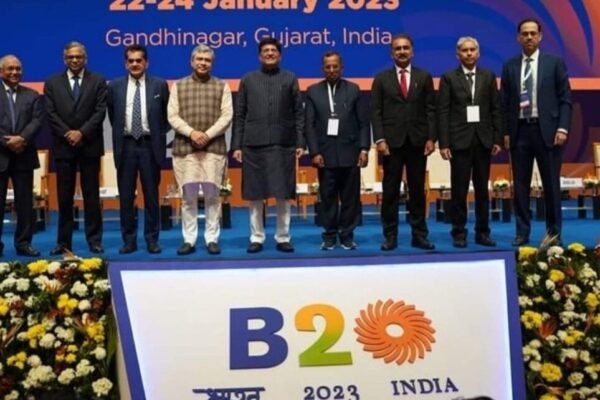As part of the B20 India Summit’s initiatives to foster digital transformation and innovation, a key recommendation has emerged from its leadership to develop a common regulatory framework for generative artificial intelligence (AI). N. Chandrasekaran, Chairman of Tata Sons and Chairperson of B20 India, highlighted this important proposal during a press conference ahead of the three-day B20 India Summit.
Chandrasekaran emphasized the significance of adopting AI on a broad scale as a key objective of the summit. He noted that generative AI holds substantial potential, but it also requires a regulatory framework to ensure responsible use while nurturing innovation. He added that finding a balance is crucial—enabling innovation without stifling its progress through over-regulation.
Highlighting India’s experience in establishing a digital public infrastructure, Chandrasekaran expressed optimism about India’s role in contributing to the development of this regulatory framework.
B20, the business forum of the G20, has been organized around nine themes and seven task forces, each addressing the needs of the global economy, society, and the global south. The task forces have focused on digital transformation, resilient global supply chains, financing sustainability transitions, economic recovery policies for micro, small, and medium enterprises, skilling and inclusivity of women, skilling for technological changes, integration of environmental sustainability guidelines (ESG) in businesses, and the integration of the African continent.
The summit aims to present its recommendations and reports during its duration from August 25 to 27. Chandrasekaran underlined the importance of resilience in the global supply chain, especially in sectors such as electronics, high-tech manufacturing, and defense. While acknowledging the need for regulatory oversight, he stressed that an approach of collaboration and innovation should be adopted rather than approaching AI regulations with a pessimistic outlook.
The B20 India leadership, through its more than 54 recommendations and over 170 policy actions, seeks to drive meaningful changes across various sectors. The summit’s reports and recommendations are expected to be released starting from August 25, further contributing to discussions on innovation, sustainability, and resilience in a rapidly evolving global landscape.














